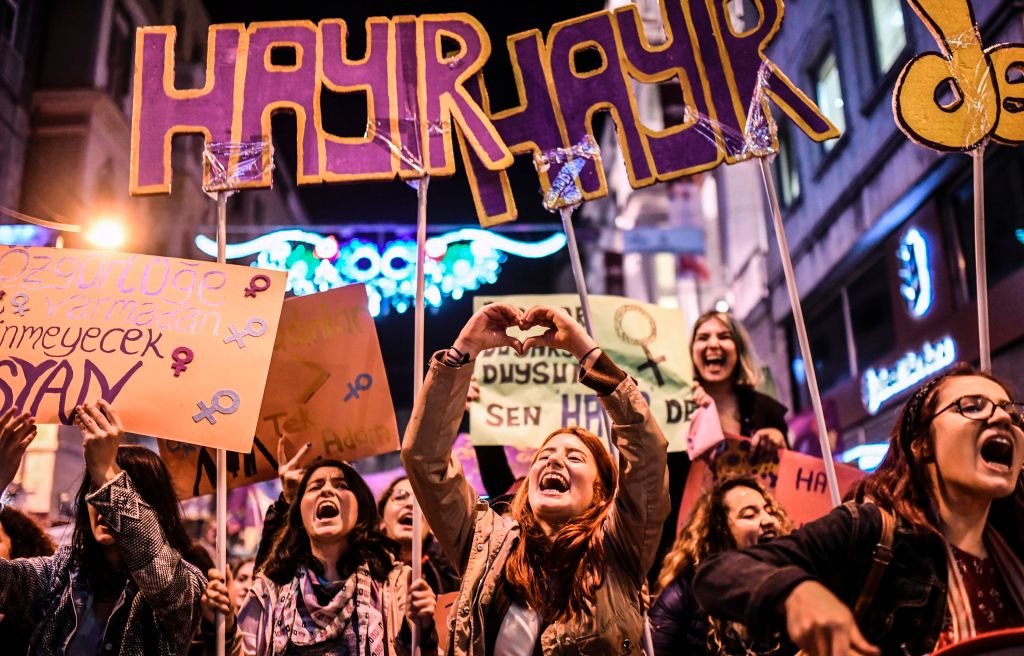Turkey’s shameful withdrawal from the Istanbul Convention today will put millions of women and girls at greater risk of violence, Amnesty International said. President Erdoğan’s announcement of the decision to quit the landmark treaty on preventing and combating violence against women and domestic violence will go down in history as the first time a Council of Europe member has withdrawn from an international human rights convention.
At the stroke of midnight today, Turkey turned its back on the gold standard for the safety of women and girls
Agnes Callamard, Amnesty International
The move has drawn blanket condemnation from around the world and sparked nationwide protests in a country where domestic violence is prevalent and at least 300 women were murdered last year alone.
“At the stroke of midnight today, Turkey turned its back on the gold standard for the safety of women and girls. The withdrawal sends a reckless and dangerous message to perpetrators who abuse, maim and kill: that they can carry on doing so with impunity,” said Amnesty International’s Secretary General, Agnès Callamard.
“Turkey has set the clock back ten years on women’s rights and set a terrifying precedent. This deplorable decision has already become a rallying point for women’s rights activists all over the world, and we must come together to resist further assaults on our rights.”
Today’s withdrawal comes three months after President Erdoğan announced the decision by presidential decree, and despite massive mobilisation by women and LGBTI people across Turkey and around the world. The decision has been roundly condemned by governments, international bodies and world leaders, including Joe Biden and European Commission President Ursula von der Leyen.
The withdrawal sends a reckless and dangerous message to perpetrators who abuse, maim and kill: that they can carry on doing so with impunity
Agnes Callamard, Amnesty International
In May 2011, the treaty was opened to signatures by the Council of Europe in Istanbul. It offers a legal framework to protect women from violence and promote gender equality, through legislation, education and awareness raising. The Convention’s four key principles of prevention, protection, criminal prosecution and policy co-ordination aim to provide a comprehensive structure for combatting gender-based violence.
Through its ratification and implementation, the Convention has led to significant improvements in how states treat those who experience gender-based violence. These include the establishment of 24-hour helplines for survivors of domestic violence in Finland, to the introduction of consent-based definitions of rape in Iceland, Sweden, Greece, Croatia, Malta, Denmark and Slovenia since 2018.
The Istanbul Convention is a widely accepted human rights instrument to address rampant levels of violence against women in Europe. In June, Liechtenstein became the 34th country out of 47 in the Council of Europe to ratify the Convention.
But the Convention is also facing a disturbing backlash across many parts of Europe and becoming a tool by several governments to spread misinformation and demonise gender equality, women’s and LGBTI rights.
Turkey’s withdrawal from the Istanbul Convention has also galvanized activists around the world to stand up for women’s and LGBTI rights
Agnes Callamard, Amnesty International
Turkey’s withdrawal from the Istanbul Convention is an extremely worrying development amid an ongoing erosion of rights in the country. On 26 June, riot police used excessive force on Istanbul Pride marchers who saw the annual celebration of LGBTI rights be banned for the sixth consecutive year. Hundreds of Pride participants were subjected to tear gas and plastic bullets. At least 47 people were detained, including two minors and an AFP journalist who was subjected to torture or other ill treatment when several police officers restrained him on the ground. One officer knelt on his neck, severely restricting his ability to breathe.
The fight to uphold the human rights of all those impacted by the scourge of gender-based violence continues
Agnes Callamard, Amnesty International
“Turkey’s withdrawal from the Istanbul Convention is the tip of a dangerous anti-rights iceberg. But it has also galvanized activists around the world to stand up for women’s and LGBTI rights,” said Agnès Callamard.
“In the months since President Erdoğan issued his decree, women in Turkey and beyond have been talking about the Convention more than ever and taking to the streets to defend what it stands for. The fight to uphold the human rights of all those impacted by the scourge of gender-based violence continues.”
BACKGROUND
Turkey is the first and only country in the Council of Europe to have withdrawn from an international human rights convention. 34 out of the 47 Council of Europe countries have signed and ratified the Istanbul Convention.
Azerbaijan and Russia are the only Council of Europe member states which have not signed the treaty yet. Last week, Ukraine and the United Kingdom announced their strong commitment to ratifying it. Mexico – which has observer state status in the Council of Europe – has also expressed its intention to be part of the convention.
The Turkish government and its supporters have said the Convention threatens “family values” and “normalises homosexuality”, claims which have been echoed by several governments, including Poland and Hungary, to justify their attempts to roll back rights.
For more information or to arrange an interview, please contact Amnesty International press office on [email protected]


